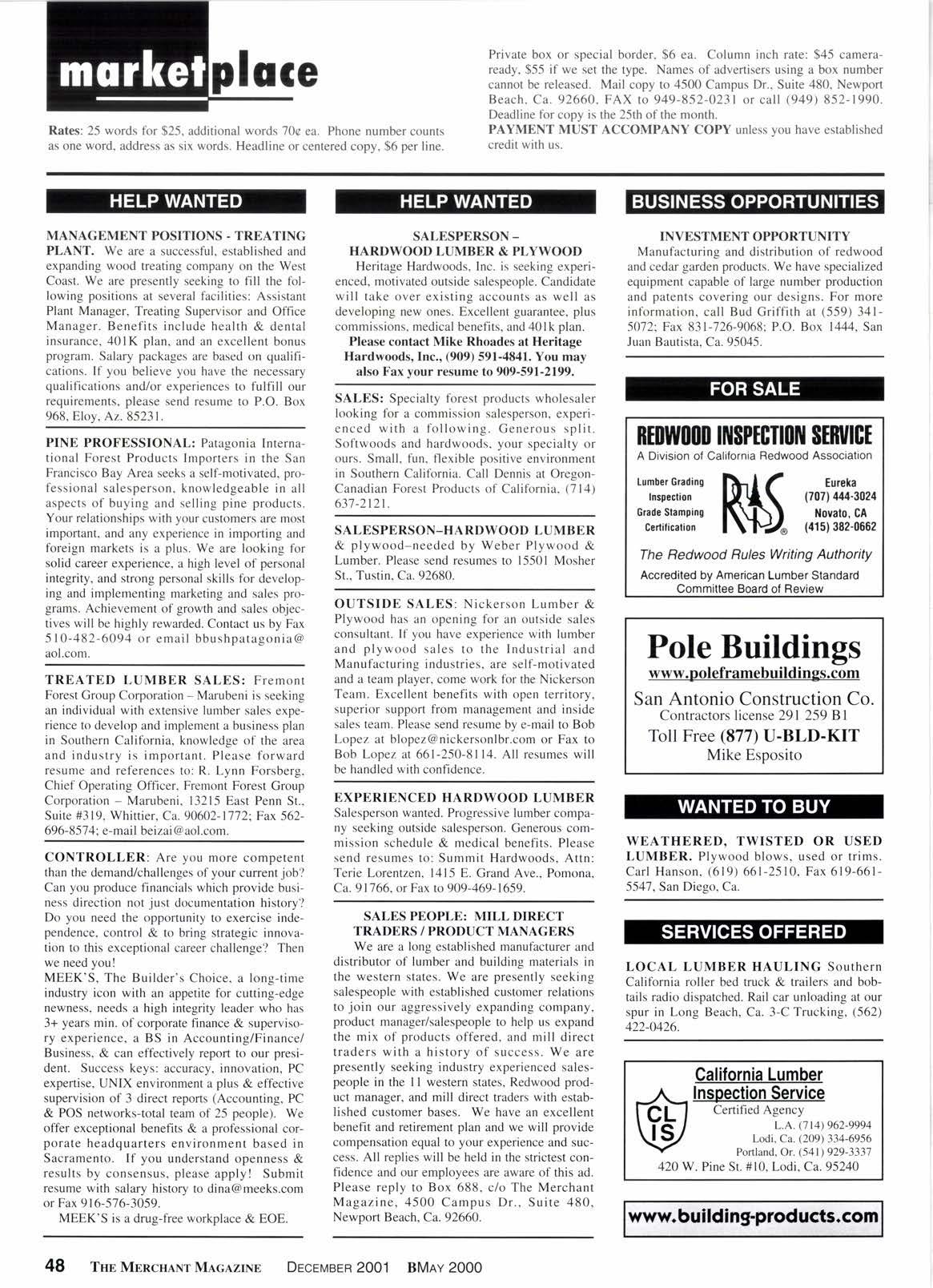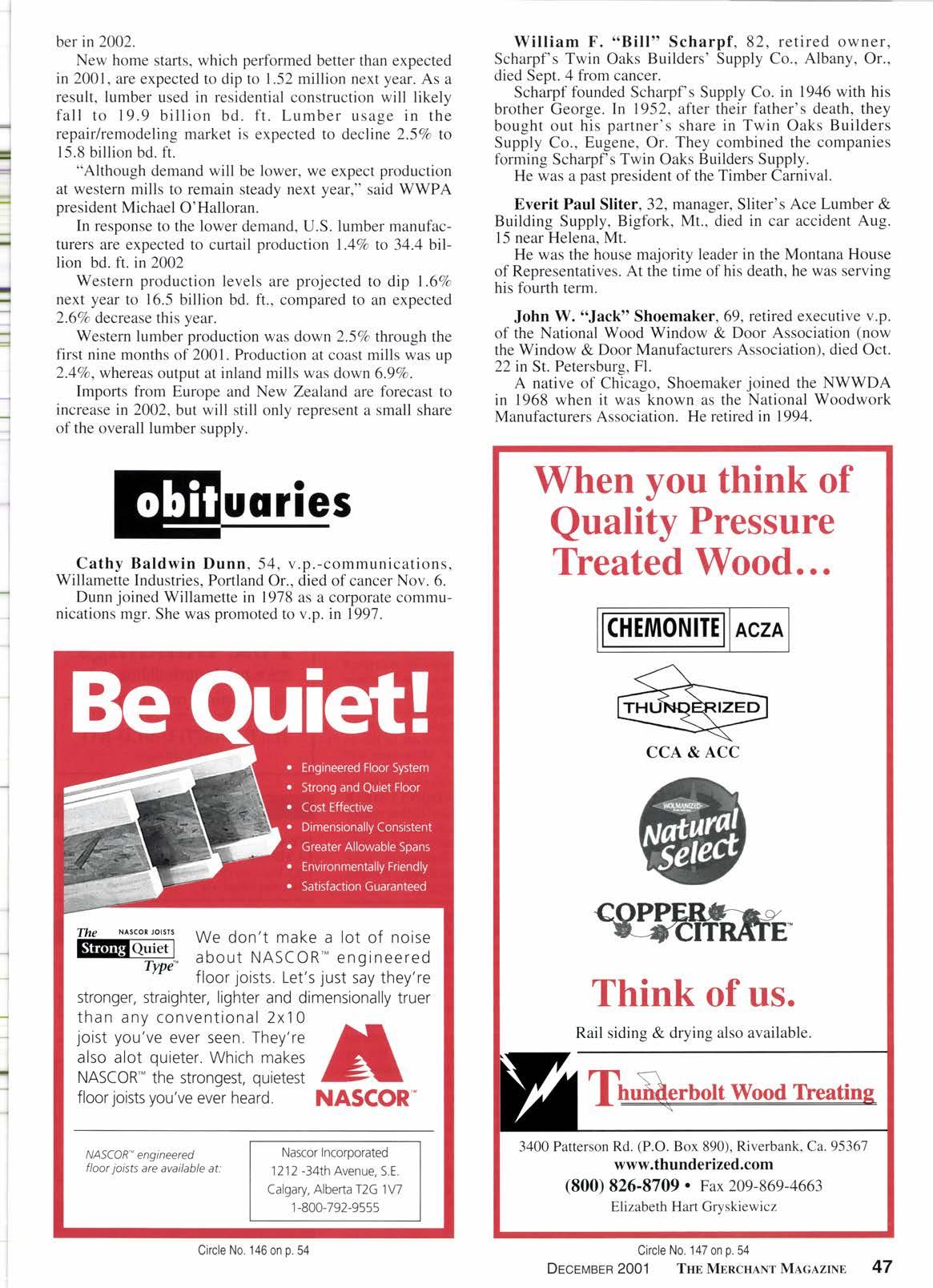
2 minute read
Let the electrons do tuhat electrons do well
By John Dervin and Donna Brown Vice President, Building Materials Director, E-Business ForestExpress Weyerhaeuser Co. www.forestexpress.com www.weyerhaeuser.com
TI I he term "e-commerce" may have as many definitions as pro dealers have types of nails! Fundamentally, it's the exchange of information (about products, services), over communications networks (Internet. intranet. extranet. VANs)to facilitate business/trade (shop, buy, advertise, sell). Typically, "e-commerce" activities are described as business-to-business (or, B2B where dealers and their suppliers exchange purchase orders, invoices, inventories) and business-to-consumer (B2C, where builders purchase consumer items from a pro dealer's Web site).
In early 2000 "dot-com fever" was rampant-multiple start-ups with unlimited venture capital were determined to use the Internet technologies to revolutionize the industry. As the dot-com bubble burst, industry-backed consortia have moved front and center. Examples include Covisint in the auto industry; ChemConnect in chemicals; Transora in retail, and ForestExpress in forest products. In general, consortia have had more stable fundins and "bricks-and- mortar" business plans. Individual companies that have participated in creating and/or using industry exchanges cite many advantages: sharing the costs of developing an e-commerce engine; leveraging a common technology platform with others in the industry, and establishing one connection through the integration hub to access multiple trading partners.
In spite of the near-term economic downturn, predictions are still optimistic for e-business. According to AMR Research, the value of goods and services to be sold through e-commerce in the U.S. will reach $4.7 trillion by 2005. Adoption in the forest products industry alone should grow from 27o in 2000 to 2O7o by 2005.
Why would a pro dealer choose to transact business electronically? First, there is no standard, cookie-cutter answer. Some, who take the "if it ain't broke, don't fix it" position, may not see a need to change. "Talking on the phone to my supplier, getting quotes and product information by fax, trading voice mails to check order status-no need to change!"
Others, however, see e-commerce as a way to reduce "non-value generating" activities, such as telephone tag, errors that lead to numerous order changes, invoice inaccuracies, etc. For them, it's obvious that key people, freed from administrative details, could devote more time to serving customers, prospecting new business and growing sales-and to working with their suppliers to better manage inventories and improve purchasing processes.
Having made the decision that B2B is in their future, what options does a dealer have? Currently, they include:
Using e-mail to communicate directly with a supplierplacing an order, inquiring about pricing, order status, etc.
Using a Web browser to click into a supplier's Web site, getting information about products and services (an possibly placing an order, checking order status, etc).
Using a Web browser to click into an e-marketplace and, using the marketplace tools (e.g., order entry, RFQ, etc), transact business with their suppliers.
System-to-system integration through a common industry hub is probably one of the most value-added B2B options. Advantages include one single point of connection to multiple trading partners, elimination of "double-entry" since documents flow to and from supplier's system through the hub to and from the dealer's system.
What does it take to get ready to do B2B? Ask yourself: Do I have an e-business strategy that enables and supports my business strategy? What's my system capability? Is it current? Do I have sufficient technology support? Are there significant business process improvements that can be achieved through e-commerce? (Examples include redeploying key people to value-added, revenue-generating activities, reducing errors, and improving information flow.) Do I have a solid relationship with a supplier with whom I would want to engage in an e-business initiative?
For the future, most believe that B2B e-commerce is here to stay and will continue to be led by exchanges. It's no longer r/business will be transacted electronically, it's how, when, with whom, how much will it cost, and how much benefit will be gained. Success will come to those who understand the value of integration,commit the resources, provide education, and lead business process change. Value will be captured when, as Weyerhaeuser's David Still says, "We allow the electrons to do what the electrons do well-routine administrative processes-and allow our people to do what people do well-provide outstandinp service to our customers."











